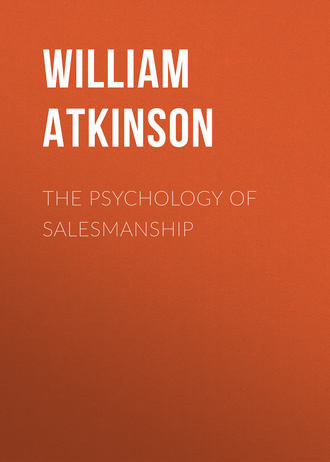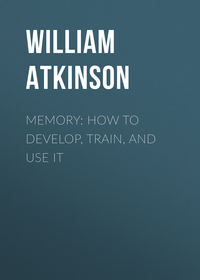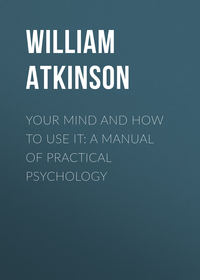 полная версия
полная версияThe Psychology of Salesmanship
VI. Imagination. This mental state is defined as: "The exercise of that power or faculty of the mind by which it conceives and forms ideal pictures of things communicated to it by the organs of sense." In the mental process of a purchase, the faculty of imagination takes up the idea of the object in which the Associated Interest has been aroused, and which has been made the subject of Consideration, and endeavors to picture the object in use and being employed in different ways, or as in possession of the buyer. One must use his imagination in order to realize what good a thing will be to him; how he may use it; how it will look; how it will sell; how it will serve its purpose; how it will "work out" or "make good" when purchased. A woman gazing at a hat will use her imagination to picture how she will look in it. The man looking at the book will use his imagination in picturing its uses and the pleasure to be derived therefrom. The business man will use his imagination to picture the probable sale of the goods, their display, their adaptability to his trade, etc. Another will picture himself enjoying the gains from his purchase. Imagination plays an important part in the psychology of the sale. It is the direct inciter of desire and inclination. The successful salesman realizes this, and feeds the flame of the imagination with the oil of Suggestion. In fact, Suggestion receives its power through the Imagination. The Imagination is the channel through which Suggestion reaches the mind. Salesmen and ad. writers strive to arouse the imagination of their prospective customers by clever word-painting. The Imagination is the "direct wire" to Desire. From Imagination it is a short step to the next mental stage which is called:
VII. Inclination. This mental state is defined as: "A leaning or bent of the mind or will; desire; propensity." It is the "want to" feeling. It is the mental state of which Desire is an advanced stage. Inclination has many degrees. From a faint inclination or bent in a certain direction, it rises in the scale until it becomes an imperious demand, brooking no obstacle or hindrance. Many terms are employed to designate the various stages of Inclination, as for instance: Desire, wish, want, need, inclination, leaning, bent, predilection, propensity, penchant, liking, love, fondness, relish, longing, hankering, aspiration, ambition, appetite, hunger, passion, craving, lust, etc.
Desire is a strange mental quality, and one very difficult to define strictly. It is linked with feeling on one side, and with will on the other. Feeling rises to desire, and desire rises to the phase of will and endeavors to express itself in action. Halleck says of Desire: "It has for its object something which will bring pleasure or get rid of pain, immediate or remote, for the individual or for some one in whom he is interested. Aversion, or a striving to get away from something, is merely the negative aspect of desire." Inclination in its various stages is aroused through the appeals to the feelings through the imagination. The feelings related to the several faculties are excited into action by a direct appeal to them through the imagination, and inclination or desired results. Appeal to Acquisitiveness will result in a feeling which will rise to inclination and desire for gain. Appeal to Approbativeness will act likewise in its own field. And so on through the list, each well-developed faculty being excited to feeling by the appropriate appeal through the imagination, and thus giving rise to Inclination which in turn strives to express itself in action through the will.
In short, every man is a bundle of general desires, the nature and extent of which are indicated by his several faculties, and which result from heredity, environment, training, experience, etc. These desires may be excited toward a definite object by the proper emotional appeal through the imagination, and by suggestion. Desire must be created or aroused before action can be had, or the will manifest in action. For, at the last, we do things only because we "want to," directly or indirectly. Therefore, the important aim of the Salesman is to make his prospect "want to." And in order to make him "want to" he must make him see that his proposition is calculated to "bring pleasure, or get rid of pain, immediate or remote, for the individual or for someone else in whom he is interested." In business, the words "profit and loss" may be substituted for "pleasure and pain," although really, they are but forms of the latter. But even when the prospect is brought to the stage of strong inclination or desire, he does not always move to gratify the same. Why is this? What other mental process interferes? Let us see as we pass on to the next stage of the purchase, known as:
VIII. Deliberation. This mental state is defined as: "The act of deliberating and weighing facts and arguments in the mind, calmly and carefully." Here is manifested the action of thought and reason – the mental process of weighing and balancing facts, feelings, and inclinations. For it is not only facts and proofs which are weighed in the mental balance, but also feelings, desires, and fears. Pure logical reasoning inclines to strict logical processes based upon irrefragible facts, it is true – but there is but little pure logical reasoning. The majority of people are governed more by their feelings and inclinations – their loves and their fears – than by logic. It has been said: "People seek not reasons, but excuses for following their feelings." The real deliberation, in the majority of cases, is the weighing of probable advantages and disadvantages – of various likes and dislikes – of hopes and fears.
It is said that our minds are controlled by motives– and the strongest motive wins. We often find that when we think we desire a thing ardently, we then find that we also like something else better, or perhaps fear something else more than we desire the first thing. In such case, the strongest or most pressing feeling wins the day. The faculties here exert their different influences. Caution opposes Acquisitiveness. Acquisitiveness opposes Conscientiousness. Fear opposes Firmness. And so on. The deliberation is not only the weighing of facts, but also the weighing of feelings.
The process of Deliberation – the weighing of desires – the play and counterplay of motives – is well illustrated by a scene in a classical French comedy. "Jeppe," one of the characters, has been given money by his wife to buy her a cake of soap. He prefers to buy a drink with the coin, for his inclinations tend in that direction. But he knows that his wife will beat him if he so squanders the money. He deliberates over the pleasure to be derived from the drink, and the pain which would arise from the beating. "My stomach says drink – my back says soap," says Jeppe. He deliberates further. Then: "My stomach says Yes! My back says No!" cries the poor wight. The conflict between back and stomach rages still more fiercely. Then comes the deciding point: "Is not my stomach more to me than my back? Sure, it is! I say Yes!" cries Jeppe. And away to the tavern he marches. It has been remarked that if the active suggestion of the distant sight of his wife armed with the cudgel, had been added to the situation, Jeppe would have bought the soap. Or, if the tavern had not been so handy, the result might have been different. Sometimes a mental straw tips the scale. The above illustration contains the entire philosophy of the action of the mind in the process of Deliberation. The salesman will do well to remember it.
Halleck thus well states the immediate and remote factors in choice: "The immediate factors are * * * (1) a preceding process of desire; (2) the presence in consciousness of more than one represented object or end, to offer an alternative course of action; (3) deliberation concerning the respective merits of these objects; (4) the voluntary fiat of decision, which seems to embody most the very essence of will. The remote factors are extremely difficult to select. The sum total of the man is felt more in choice than anywhere else. * * * Before a second person could approximate the outcome, he would have to know certain remote factors, the principal being: (1) heredity; (2) environment; (3) education; (4) individual peculiarities." This eminent authority might well have added an additional element – a most important one – as follows: (5) SUGGESTION.
The Salesman watching carefully the shifting scale of Deliberation, injects a telling argument or suggestion into the scale, which gives weight to his side at a critical stage. He does this in many ways. He may neutralize an objection by a counter-fact. He adds another proof or fact here – a little more desire and feeling there, until he brings down the scale to a decision. It must be remembered that this Deliberation is not regarding the desirability of the proposition – the prospect has admitted his desire, either directly or indirectly, and is now engaged in trying to justify his desire by reason and expediency. He is seeking for reasons or "excuses" to back up his desire, or perhaps, is endeavoring to strike a balance of his conflicting desires and feelings. His mental debate is not over the question of desiring the goods, but over the expediency and probable result of buying them. It is the "to buy or not to buy" stage. This is a delicate part of the process of the purchase, and many prospects act like "see-saws" during the process. The clever Salesman must be ready with the right argument at the right place. To him this is the Argumentive Stage. Finally, if the Salesman's efforts are successful, the balance drops, and the process passes to the next stage, known as —
IX. Decision. This mental stage is defined as: "The mental act of deciding, determining, or settling any point, question, difference, or contest." It is the act of the will, settling the dispute between the warring faculties, feelings, ideas, desires and fears. It is will acting upon reason, or (alas! too often, upon mere feeling). Without entering into a metaphysical discussion, let us remind you that the practical psychology of the day holds that "the strongest motive at the moment wins the choice." This strongest motive may be of reason or of feeling; conscious or unconscious; but strongest at that moment it must be, or it would not win. And this strongest motive is strongest merely because of our character or "nature" as manifested at that particular moment, in that particular environment, under the particular circumstances, and subject to the particular suggestions. The choice depends more upon association than we generally realize, and association is awakened by suggestion. As Halleck says: "It is not the business of the psychologist to state what power the association of ideas ought to have. It is for him to ascertain what power it does have." And as Ziehen says: "We cannot think as we will, but we must think just as those associations which happen to be present prescribe." This being the case, the Salesman must realize that the Decision is based always upon (1) the mental states of the man at that moment; plus (2) the added motives supplied by the Salesman. It is "up to" the Salesman to supply those motives, whether they be facts, proofs, appeals to reason, or excitement of feeling. Hope, fear, like, dislike – these are the potent motives in most cases. In business, these things are known as "profit or loss." All the faculties of the mind supply motives which aroused may be thrown into the balance affecting decision. This is what argument, demonstration and appeal seek to do – supply motives.
(Note: – It might naturally be supposed that when the final stage of Decision has been reached, the mental process of purchase is at an end. But, not so. Will has three phases: Desire, Decision, and Action. We have passed through the first two, but Action still is unperformed. A familiar example is that of the man in bed in the morning. He ponders over the question of rising, and finally decides to get up. But action does not necessarily result. The trigger of Action has not been pulled, and the spring released. So thus we have another mental state, known as: – )
X. Action. This mental state is defined as: "Volition carried into effect." Mill says: "Now what is an action? Not one, but a series of two things: the state of mind called a volition, followed by an effect. The volition or intention to produce the effect is one thing; the effect produced in consequence of the intention is another thing; the two together constitute the action." Halleck says: "For a completed act of will, there must be action along the line of the decision. Many a decision has not aroused the motor centers to action, nor quickened the attention, for any length of time. There are persons who can frame a dozen decisions in the course of a morning, and never carry out one of them. Sitting in a comfortable chair, it may take one but a very short time to form a decision that will require months of hard work. * * * Some persons can never seem to understand that resolving to do a thing is not the same as doing it. * * * There may be desire, deliberation, and decision; but if these do not result in action along the indicated line, the process of will is practically incomplete." Many a person decides to do a thing but lacks the something necessary to release the motive impulses. They tend to procrastinate, and delay the final act. These people are sources of great care and work to the Salesman. Some men can get their prospects to the deciding point, but fail to get them to act. Others seem specially adapted to "closing" these cases. It requires a peculiar knack to "close" – the effort is entirely psychological. We shall consider it in a subsequent chapter under the head of "Closing." To be a good "closer" is the ambition of every Salesman, for it is the best paid branch of his profession. It depends largely upon the scientific application of suggestion. To lead a prospect to Action, is to pull the trigger of his will. To this end all the previous work has been directed. Its psychology is subtle. What makes you finally get out of bed in the morning, after having "decided to" several times without resulting action? To understand this, is to understand the process of the final Action in the mind of the buyer. Is it not worth learning?
In the succeeding chapters we shall consider the several stages of the "Salesman's Progress" toward a sale – the Approach, the Demonstration, and the Closing. In these stages of the Salesman, we shall see the action and reaction upon the Mind of the Buyer, along the lines of the Psychology of the Purchase. In the Sale-Purchase the minds of the Salesman and the Buyer meet. The result is the Signed Order. The psychological process of the Sale is akin to the progress of a game of chess or checkers. And neither is the result of chance – well defined principles underlie each, and established methods are laid down for the student.
CHAPTER VIII
THE APPROACH
Old salesmen hold that in the psychology of the sale there is no more important stage or phase than the introductory stage – the stage of the Approach. Pierce says: "Experienced salesmen will tell you that the first five minutes in front of a prospect is worth more than all the remainder in the matter of getting the check. Why? Because it is then that the prospect is forming his impressions of you. Usually he is obliged to form this quick size-up of the man he meets, in order to conserve his time for important duties. Therefore it is your duty to have this first impression the best within your power. And the best way to develop this is to be genuine." But it must never be lost sight of that the First Impression is solely for the purpose of obtaining an entrance for the fine edge of your wedge of salesmanship, which you must then proceed to drive home to its logical conclusion, – the Order. An impression for impression's sake is a fallacy. Remember the old story of the Salesman who wrote in that he was not making sales, but that he was "making a good impression on my customers." The firm wired back to him: "Go out and make some more impressions – on a snow bank." Do not lose sight of the real object of your work, in obtaining the preliminary results.
The National Cash Register Company instructs its salesmen regarding the First Impression, as follows: "Remember, the first five minutes of speaking to a man is likely to make or break you as far as that sale is concerned. If you are in any way antagonistic or offensive to him, you have hurt your chances badly from the start. If you have failed to definitely please or attract him, you have not done enough. It isn't sufficient to be merely a negative quantity. You should make a positive favorable impression, and not by cajolery nor attempted wit nor cleverness. The only right way to gain a man's liking is to deserve it. The majority of men do not often know just what the characteristics of a man are which makes him pleasing or displeasing to them; but they feel pleased or displeased, attracted or repulsed, or indifferent, and the feeling is definite and pronounced, even though they cannot understand just what makes it. A storekeeper in the smallest way of business in a little country village is just as susceptible of being pleased or offended as any merchant prince. It should never be forgotten that whatever his position may be, 'a man's a man for a' that.'"
It is not so much what a man says when he approaches the prospect, as the way he acts. It is his manner, rather than his speech. And back of his manner is his Mental Attitude. Without going into subtle psychological theorizing, we may say that it may be accepted as a working hypotheses that a man radiates his Mental State, and that those he approaches feel these radiations. It may be the suggestion of manner, or it may be something more subtle – no use discussing theories here, we haven't the time – the fact is that it acts as radiations would act. This being recognized it will be seen that the man's Mental Attitude in the Approach must be right. In the previous chapters we have had much to say to you regarding the factors which go to create the Mental Attitude. Now is the time to manifest what you have learned and practice – for you are making the Approach.
Carry in mind Holman's catechism, of which we have told you. Maintain your Self-Respect, and remember that you are a MAN. Pierce says of this: "One reason for this is that self-respect is necessary in your work. And self-respect cannot obtain where there is lack of confidence either in your own ability or in your line of goods. Assuming that you take only such a line as you yourself can enthusiastically endorse, it must be remembered that your goods place you absolutely on a par with the merchant. Hence, you talk to him shoulder to shoulder, as it were. You are not as a slave to a master! as a hireling to a lord; as a worm to a mountain; although this is the usual attitude untrained salesmen consciously or unconsciously assume. They are timid. They feel they might know their goods better. They feel, perhaps, that the prospect knows their goods or their competitors' goods better than they do themselves. Fear is written all over their faces as the approach is made. Nine-tenths of the fear is due to ignorance of the goods. The other tenth is lack of experience."
Regarding this matter of Fear, we would say that the experience of the majority of men who have lived active and strenuous lives, meeting with all sorts of people under all sorts of circumstances, is that the cause of Fear of people and things exists chiefly in the imagination. It is the fear of anticipation rather than the fear of actual conditions. It is like the fear felt upon approaching a dentist's office – worse than the actual experience of the chair. Suspense and fearful expectation are two of the great sources of human weakness. Experience shows us that the majority of things we fear never happen; that those which do happen are never so bad as we had feared. Moreover, experience teaches us that when a real difficulty confronts us, we usually are given the strength and courage to meet and bear it, or to overcome it – while in our moments of fearful anticipation these helpful factors are not apparent. Sufficient for the moment are the evils thereof – it is not the troubles of the moment which bear us down, but the burdens of future moments which we have added to our load. The rule is to meet each question or obstacle as it arises, and not to add fear of trouble beyond to the work of the moment. Do not cross your bridge till you come to it. The majority of feared things melt away when you come up to them – they partake of the nature of the mirage. It is the ghosts of things which never materialize which cause us the greatest fear. Banish Fearthought from your Mental Attitude when you make the Approach.
But, a word of warning here: Do not become "fresh" or impudent because you feel Self Reliant and Fearless. While realizing that you are a Man, do not forget that the prospect is also one. Impudence is a mark of weakness rather than of strength – strong men are above this petty thing. Be polite and courteous. The true gentleman is both self-respecting and polite. And, after all is said and done, the best Approach that a Salesman can make is that of a GENTLEMAN. This will win in the long run, and the consciousness of having so acted will tend to strengthen the Salesman and preserve his self-respect. Remember not only to manifest the self-respect of a gentleman – but also to observe the obligations of politeness and courtesy which are incumbent upon a gentleman. Noblesse oblige– "nobility imposes obligations."
If you want a maxim of action and manner, take this one: "Act as a gentleman should." If you want a touchstone upon which to test manner and action, take this: "Is this the act of a gentleman?" If you will follow this advice you will acquire a manner which will be far superior to one based upon artificial rules or principles – a natural manner – because the manner of a gentleman is the expression of true and pure courtesy, and will be respected as such by all, whether they, themselves, observe it or not. We have seen many instances in which the maintenance of the true gentlemanly spirit under strong provocation has completely disarmed boorishness, and won friendship and regard from those apparently opposing it at the time.
The first psychological element of a Sale is that of the First Impression upon the buyer. And the impression must be of a favorable kind. There must be nothing to create a bad impression for this will distract the attention from the purpose of the Approach to the particular object awakening the unpleasant impression. The first point preliminary to gaining attention, is to know the name of the man you are approaching; and if possible just where he is. Nothing is more demoralizing to the Salesman, and more likely to break up the psychological influence of the Approach, than a lack of knowledge of the name and identity of the man you wish to see. The miscarriage of an Approach occasioned by mistaking the person should be avoided. If you do not know your man, or where he is in the office, it will be well to inquire of the others present, politely of course, where "Mr. X's" desk is. If you happen to ask this question of "Mr. X" himself, you can easily adjust yourself to the occasion. The fiasco of approaching "Mr. A" and greeting him as "Mr. X" is apt to be confusing and weakening, and tends to bring the element of ridicule into the interview, unless the Salesman has the tact and wit to pass it off. If possible, avoid asking for "the proprietor," or inquiring of a man, "are you the proprietor?" If you do not know the proprietor's name, ask it of some one.
The National Cash Register people say to their salesmen: "It is manifestly improper to describe a definite form of words and require salesmen to use them in all cases when they approach business men at the first interview. What would be proper to say to one man under given circumstances might be unsuitable to say to another under different circumstances. Much must be left to the discretion of the salesman. At the same time there are certain leading statements to be made, and certain ways of making them which experience has shown to be well adapted to the end in view. * * * It is not necessary that this introductory talk should be long. Often a short talk is more convincing. We do not advise salesmen to introduce themselves by sending in a card, but prefer that they should depend wholly on what they are able to say to secure a hearing. We strongly disapprove of obscure introductions and all tricks, and believe that a man who has something worth saying, and is not ashamed of his business, can make known his errand in a bold, straightforward manner. A salesman should adapt himself to his man, but at the same time he should have a fixed idea of what he has to say. He should be dignified and earnest. * * * As soon as you do succeed in reaching the proprietor, and have said to him, 'Good morning! Is this Mr. Johnson?' then say directly and plainly, 'I represent the National Cash Register Company.' This immediately puts you on a square footing, and if he has anything to say against your business it will draw his fire immediately. If he has nothing to say, proceed to business at once, but don't under any circumstances say, 'I called to sell you a register,' or 'I called to tell you about our registers,' but put it rather in this way, 'I want to interest you in our methods for taking care of transactions with customers in your store.' The difference between the two ways of saying it is that one begins with your end of the business – the thing that interests you; while the other begins at his end of it – the thing presumably interesting to him."









